About
Dr. Breshears looks at the question of gospel. What is it? What’s it good for? What difference does it make?
Audio Only
Transcript
We are looking at this question of gospel. What is it? What’s it good for? What difference does it make? And so, what I want to do, because it’s such an important question, is begin with Jesus. So, Mark chapter one, after John was arrested, Jesus came into Galilee, and is proclaiming the gospel of God.
And then he summarizes this way, “The time was fulfilled that this is something promised,” and you go back and look at Isaiah 52 and see the good news that comes on the feet of the One, “the kingdom of God is at hand.” So it’s about a kingdom; it isn’t about a king. It’s about establishing an Edenic order in this world.
And he says, “Repent and believe the gospel.” That’s how Jesus begins his ministry, and this gospel or good news is what we’re talking about. Then he ends his ministry, go to Matthew 28, 11 disciples went into Galilee, the mountain to which, Jesus had directed them. They worshiped him, but some doubted in, you know, and I get that. “Jesus came before them,” and really important, “all authority in heaven on earth.”
Okay, so what are you looking at there? Well, that’s the kingdom thing: “authority on heaven and earth.” Of course, that kicks us back to Genesis 1. “In the beginning, God created the heaven and the earth, all authority in heaven.” “Earth has been given to me,” that’s him as Messiah. And he says this, “Go therefore and make disciples of all nations, baptizing them in the name of the Father, Son, Holy Spirit.” So, there you have one name, three persons. So, you’ve got Trinitarian. I mean, look at all the theologies involved in this. We won’t get into all of that, but I mean, this is so critical: kingdom of God, Messiah, Trinity, disciples… “All I have commanded, and I am with you always to the end of the age.”
I mean, this is the foundation. So, the question is what is the gospel? The foundational sermon, the whole church is after the Pentecost experience. So again, let’s just follow it through a little bit, Acts 1, he’s saying, “You’ll be baptized by the Holy spirit not many days from now,” so he comes together and he says, “You will receive power. You will be my witnesses throughout the whole earth.” And then he’s exalted. The Holy spirit is poured out in chapter two. You have tongues; you have all that going on.
And then Peter stands up, and he preaches the foundational sermon for the whole church age. And that’s where I think the foundation of the gospel is. So, if you got your Bibles, why don’t you do some marking up?
So, in Acts 2, the sermon begins back in verse 14. Peter stands up, and he says, “this is what was uttered by the prophet, Joel.” Again, this is a promise being fulfilled. And in this promise, he’s talking about the last days, and I won’t read it through to you because you can see it there. And then he begins the gospel: “Men of Israel.” So there you go. These are the people he’s talking to, people coming in from all over the world for the Pentecost. “Hear these words.” Now, here we go with the gospel. I’m going to give you an outline.
My friend, Steve Walker, said, “Use revelation.” Revelation is “what God does:” foundation of the gospel. And when you think “gospel,” this is the heart of the gospel, “what God does.” So, then the next step is response: “what we do.” The next step is result: “what we get.” So that’s the online Steve suggested for the gospel. I think it’s a great outline.
Let’s think about this a little bit. Revelation is “what God does.” And when we think of “gospel,” we often think about that: Jesus died on the cross, which the response is “what we do.” And you can probably fill in some things. We know it from Acts 2, and the result is “what we get.” So, let’s take a look at it here, Acts 2 verse 22. It’s talking about “Jesus is attested.” And of course, you ask, “Well, as what?”
(All of the book of Luke is part 1; Acts is part 2.) All this stuff back in Luke talks about it. So you know about him, but this ends up finishing down here in verse 36. So there you go. “This Jesus is Lord and Christ.” When you think about this, we’re thinking about verses 22 and 36, and we’re thinking here, Jesus is Lord and Christ, and of course, Christ there is “Messiah,” the promised one. So again, lots of theology here. Lord is the translation of “Yahweh,” the personal name of God. So, when you think Lord here, you’re thinking of this as the way we translate, “Yaweh.”
Think about this for a minute. In Isaiah chapter 40, it says, “Make straight the pathway of the Lord who is coming.” And Lord there, John the Baptist quotes that in Mark 1 and Matthew 3. And he applies that to Jesus. This is a way of saying Jesus is “Yahweh,” “Come among us.” In Romans 10, he talks about, “Those who call upon the name of the Lord will be saved. But if you go back to the quote in Joel 2, it’s “Yahweh.” So, what he’s saying is when he says, “Lord,” that’s “Yaweh”, or another term for that is “Emmanuel.” That’s the first step of the gospel.
It begins in verse 22. So, the first step of what God did is he sent his son, Jesus. Emmanuel, Lord, Messiah. Got that? Now, verse 23. I want you to think about it. This Jesus, what’s this saying about him? “Crucified and killed.” And this isn’t a mistake. This is something that’s the plan of God, the definite foreknowledge of God. So, “revelation,” “response,” “result.” Is this “what God did,” “what we do,” or “what we get?” That’s revelation. So, he’s crucified. That’s verse 23. How about verse 24?
What does it say here? Resurrection. So, revelation, response, result. Is this what God did, what we do, or what we get? That’s what God did. God raised him from the dead. Now look at verse 25. This is David, so when you look at this quote, that’s actually from Psalm 16. He’s interpreting. This is not talking about David. So God had sworn an oath about one of his descendants, whom he foresaw and spoke about the resurrection of the Christ. The Messiah would not have been banned in Hades or seen corruption. “This Jesus, God raised up for all witnesses.” See what’s happening. This started back way back here in verse 24.
It goes all the way through verse 32. Now, if you look at verse count, which one’s more important? Crucifixion or resurrection? And verse count doesn’t count, but interesting here, the crucifixion gets one verse. The resurrection gets like nine verses. Critically important that the resurrection be a part of our gospel; not just his death is important, but that Jesus is Emmanuel. He’s good news. He is the King of the kingdom, crucified, resurrected. Let’s keep reading verse 33. What do you see here?
Is that revelation, response, result? That’s revelation. So 33, “Jesus is exalted to the right hand of God.” So it’s not just “exalted the right hand of the father,” important that is, but he’s also poured out the Holy spirit on whom?
On the disciples. So revelation, response, result. See, I want you to read this from the Bible. I don’t want you to just come up with an idea, read a track or something like that. Nothing wrong with tracks, but our authority is in scripture. You understand preaching the Bible.
And he says, David, again, he’s quoting. “David said to my Lord, ‘Sit it right hand until I make your enemies, your footstool.’” This is from Psalm one 10. It’s referring back to verse 33.
What is he exalted over? This is part of the snake-crushing work back from Genesis 3. He is exalted above all the satanic demonic powers.
I’m going to be in Uganda. And boy, I don’t have to talk to them about demonic stuff. They know. Well, Jesus is exalted above all those powers.
Keep reading now when they heard that. Who’s “they?” That’s the people who are watching the disciples as they’re speaking in tongues and prophesied. They were cut to the heart. What’s a churchy word for “cut to the heart?” A conviction. Okay. Is that revelation, response, result? Which one is that? When you “cut to the heart,” that’s the response. Verse 37, “convicted.”
And see what I think of “gospel,” one of the real important things is there’s got to be some recognition. We have a need. We’ll talk about where to start gospel conversations at another piece here, but there’s got to be a situation. There’s got to be an awareness of a need before we can have a savior. So, convicted. Okay. So, to Peter and the rest of the guys, what shall we do now? It doesn’t say it here specifically, but on their asking, “What should we do,” they’re cut to the heart. They’re probably realizing that crucifying the Messiah is not a good idea.
Hmm. So, what I’m going to suggest here, and this is actually me adding; it’s not directly in scripture, but the idea of confession, talk about what I need.
I need to admit that I have a need. That’s 37. Okay. So verse 38, Peter said to them, “Repent, be baptized in the name of Jesus Christ for the forgiveness of your sins; and you shall receive the gift of the Holy spirit.”
So what’s the first thing Peter said to them. “Repent.” Okay. Revelation response result. Is that what God did? What we do or what we get? Okay. That’s response. Yep. Now, have to do just a little bit of theologizing here, because the word means “to be sorry again,” if you look in pieces. And we often think of repentance as somebody weeping and wailing, and that may be a part of it, but the heart of repentance, if you look in acts chapter 26,
Paul is doing his thing before Agrippa and verse 18 is one of these summaries of the gospel. He gets the vision and then he says, “I did all these things in Damascus, Jerusalem Gentiles, so that they should repent and turn to God.” That’s the heart of repentance. But look what comes next. “Performing deeds in keeping with their repentance.” Seeing what repentance here is, “Repent” means, “Changing my mind about who’s God around here.” The works, the changed behavior is a result of repentance, not the content or repentance. This is really important. We have to repent, but it doesn’t mean that we change our ways yet.
Repentance means, “Change my heart, change my mind, change my fundamental values.” Change my mind really about who’s God around here, at least in my part of the world. The number one god is me. We’re so autonomous. Okay, so go back to Acts 2:38. What should we do? “Repent and be baptized.” Hmm. So baptism, revelation, response, result? Response, right?
Baptism is the expression and confirmation that I am a Jesus follower. There’s all kinds of theology behind this, but it’s expression is “confirmation.” It’s the Bible’s way to say, “I’m a Jesus guy.” And I say it to God, family and friends. So, confirmation to God, family and friends that I’m a Jesus follower. What we do is we use the sinner’s prayer; where the Bible uses baptism. I’d like to put baptism back in there, not as a sacrament. I mean, this is not Roman Catholicism. Baptism doesn’t save you.
But baptism is a way to say publicly confirmation that I am saved now. Big controversy. I was just at a wedding a couple of days ago. Andrew and Kendra are beautifully married couple. Jonathan was the pastor.
And when they went through this wedding, at the end of it, Jonathan said, “As a gospel minister, the gospel of Jesus Christ, I pronounce you, husband and wife.” He spoken to exist in something you never been there before. And what happens is this is a very important ceremony where they expressed it.
Everyone, God, family, friends, we are one. And they brought that into existence. I think that’s an analogy of baptism. A wedding does not make you married. I mean, we know people go through weddings, and they are no more married. I mean they got their fingers crossed the whole time. Call it common law marriage.
Same way for baptism. I think it’s an important, biblically ordained ceremony way to say, “I’m a Jesus guy,” baptism. Okay. And now, what? “forgiveness of sins.” Revelation, response, result? Forgiveness: something God did, something we do, something we get. Revelation, response, result.
Yep. That’s result. So that’s what we get, “forgiveness of sins.” And why is that? Because Jesus is the sacrificial lamb who paid the penalty for our sins. It’s amazing. He does more than that, but that’s a real, foundational thing. Forgiveness of sins. Okay, good. There’s so much we can unpack here. This is a quick overview.
“And you received a gift of the Holy spirit.” Revelation, response, result? That’s the result, another one. This is also verse 38. So we get, “received the gift of the Holy spirit.” Now, I like to call this a new life. I’m a theology guy. When I think of forgiveness of sins, I think of the term “justification” and the two aspects of justification, “forgiveness” and “acceptance.” Those are the two aspects of justification, and that comes by grace alone, through faith alone, in Christ alone. And when I think of new life, I think of “regeneration.”
And regeneration has two aspects to it. Make this parallel here. Regeneration has the aspects of new heart (new desires) and indwelling spirit. So when I look at this, these are both by grace alone, through faith alone, in Christ alone at conversion. Apart from all works. These are two huge gifts. We get regeneration, new life and justification, forgiveness, and acceptance. And I’ll explain those for you.
So, he summarizes this for you and everybody with many words, he said, “save yourselves from this crooked generation.” “So those received his word were baptized.” “Received his word.” Revelation, response, result? Is that what God did, what we do, or what we get? That’s a true response. What’s another name for that? Well, how about faith?
I actually prefer the word “trust.” Because I think that’s more what it is. It’s not just recognition. It’s a heart attitude of entrustment. Faith is entrusting myself to the truth of this gospel, this good news. Jesus Christ, Emmanuel, Lord, Messiah: died, rose, exalted, poured out the spirit. I’m trusting. That is God’s way of salvation.
I’m trusting that this really is God, this guy, Jesus, who’s crucified of all things. How can God be crucified in death? Well, that’s just an incredible paradigm as the way that God overcomes through death and resurrection. And of course, calls us to do the same thing. Okay, “3000 people were added.”
Now we back off a little bit here. “They devoted themselves.” Okay. Clearly, that something they do. So that’s response. What do they do? They’re devoting themselves to apostles, teaching, fellowship, breaking bread, prayers. So, this is new community of the spirit.
And in this new community, we become a part of this new community by virtue of the fact that we have been become “a Jesus guy.” Because when you become a part of Jesus, you’re not just a one-to-one connection with him, he became part of his kingdom community, his disciples, his followers, and that community is so important. And one of the mistakes we make here in the United States so often is that we see our salvation as a me and Jesus thing. And then community is an additional part of that. Something that’s an optional add on. But see, in scripture, it’s a whole different thing. They immediately devote themselves.
They immediately are part of a community where signs and wonders are being done. They’re immediately are a part of a community where they’re sharing their stuff. They’re taking care of each other’s needs. This is a community where righteousness is being done. I mean, this is why community’s so important. It’s a community.
The spirit that’s characterized by miracles, divine workings. Now you can go crazy with miracles to be sure. But what I find is so many churches are kind of not into miracles because all the abuses that happen there. God’s powerful working as a part of your church. You should see alcoholics getting off the booze by the power of the Holy spirit and the help of the community.
You should be seeing a marriage is being put back together. And, generosity: this is a work of the spirit in that community. We see God’s character at work.
Okay. And we go on. “Those who are being saved.” And I think what happens here, it’s not a smooth transition, but through verses 40-47, somewhere in here, we get a new mission. And that mission is to show the power of God, to the people you run across. And that ties back to, “go to all the world,” back in Acts 1:8. Now there’s one of the things I want to add in here.
It’s not stated in so many words, so I have to put, this is Gerry talking, but I think it’s here. And I just put in, “new hope.” And part of the reason I put this in is because this is a place where this promised Messiah, that goes clearly back to page three of the Bible, finally, the promise of God to be among us as here. So, there’s a hope that comes in the permeates.
Now let me look at this again. We have revelation. Jesus is Lord, Messiah, Emmanuel, who died, rose, exalted, poured out the spirit. That’s what God did. That’s really the heart of the gospel. But I think we need all five of those. We need to know who Jesus is. He is God “come among us,” crucified and resurrected. A crucifixion relates to sacrifice and justification, resurrection leads to new life. And the new regeneration, exalted over all the hostile powers, crushing the serpent and pouring out the Holy spirit.
And that spirit is, I mean, that’s the life of the church. Then the response, “what we do.” Convicted, confess, repent, baptized, and trust. And that’s a package. It’s not a sequence. They all come together. Or I suppose conviction and confessional would come first. But the point is, this is all coming together.
Convicted: I have a need. I think this gospel can help me. Confession: Lord, I need your help. I think verbalizing; it’s a very hopeful piece of what’s happening here. The baptism: can confessing the whole world through this dramatic action that I’ve died with Christ resurrected to newness of life, and in the faith, in the response, what we get: we get forgiveness.
We get new life, new community, new mission, a new hope. Let’s do this one more time, because this is so foundational. What is the gospel? It’s the good news of the kingdom. And when Luke unpacked it, he has these five things.
Jesus is Emmanuel, Lord, Messiah: crucified, resurrected, exalted to right hand of God over the hostile powers poured out the spirit on his church. If we are convicted, confess, repent, (change of mind about who’s God around here) baptized (way of expressing and confirming I am a Jesus follower), trust, which of course packages it all together, then we get forgiveness.
We get new life, new community, new mission, new hope. Every sermon I Preach has that gospel summary in it at least once. And that’s what we’re talking about. What did God do? Emmanuel, Lord, Messiah: crucified, resurrected, exalted, poured out the spirit.
What do we do: Convicted, confess, repent, baptized, belief. What do we get: Forgiveness, new life, good news.

Gerry Breshears has been a professor of theology at Western Seminary since 1980. In addition to teaching and lecturing at a number of colleges and seminaries around the world, he speaks in many churches. He works in leadership in the Evangelical Theological Society nationally and regionally. He is coauthor of Vintage Church, and Doctrine with Mark Driscoll. He is an elder and a member of the preaching team at Grace Community Church of Gresham, Oregon.

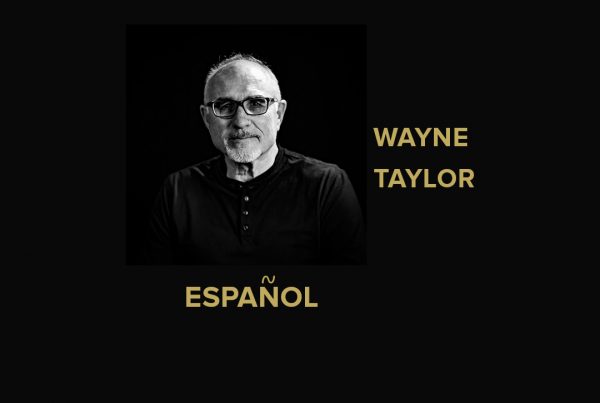




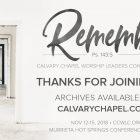

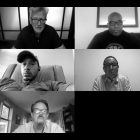

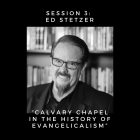

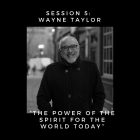
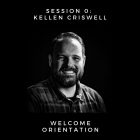







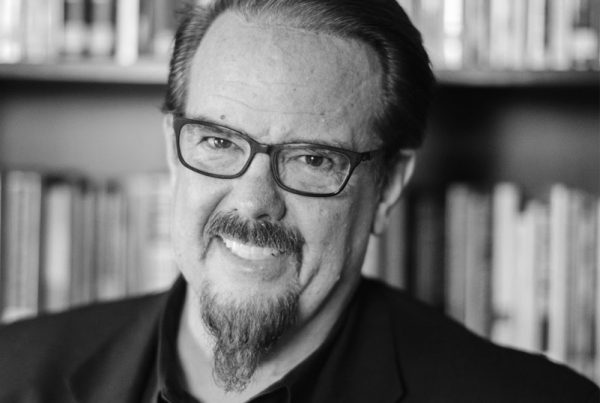


This is so good…